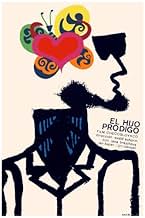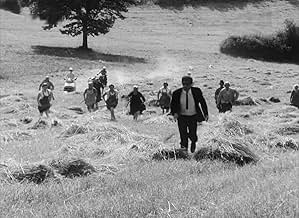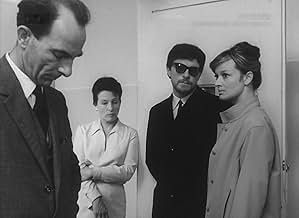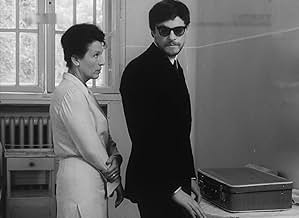Engineer Jan Sebek (Jan Kacer) is undergoing treatment in a mental home after his unsuccessful attempt to commit suicide. His therapist, via discussions both with the patient and with people... Read allEngineer Jan Sebek (Jan Kacer) is undergoing treatment in a mental home after his unsuccessful attempt to commit suicide. His therapist, via discussions both with the patient and with people who know him, tries to find out what made the young and seemingly satisfied man decide to... Read allEngineer Jan Sebek (Jan Kacer) is undergoing treatment in a mental home after his unsuccessful attempt to commit suicide. His therapist, via discussions both with the patient and with people who know him, tries to find out what made the young and seemingly satisfied man decide to end his own life. Jan's pretty wife Jana (Jana Brejchová) claims not to know about anythi... Read all
- Awards
- 1 win & 1 nomination total
- Zdenek
- (as Jirí Kilián)
- Jana's Mother
- (as Anna Lebedová)
- Jana's Father
- (as Ant. Lebeda)
- Parson
- (as J. A. Stehlík)
- Charwoman
- (as Hana Kreihanzlová)
- Director
- Writers
- All cast & crew
- Production, box office & more at IMDbPro
Featured reviews
The film begins with dialogue between a man (whose name we eventually learn is Jan) and his therapist discussing a recent suicide attempt that Jan doesn't know the cause of. During the early part of this exchange, we don't see either of the speaking characters, but instead the camera shows us a montage of shots in their outermost surroundings. Although these characters are alive, this sequence almost gives the impression of witnessing a conversation between ghosts, an effective foreshadowing for our lead's hollow existence. Although Jan is a successful engineer with a wife and child, he can't seem to function or find much satisfaction in the world around him. This lack of satisfaction is the closest thing we get to a real answer, but ultimately it feels that we've barely scratched the surface of the anxiety plaguing him.
Low key would be the best phrase to describe the performances and overall mood. There is scarcely any music except for a few scenes. The performances are almost completely drained of any theatricality, with only the occasional spurts of passion. Jan especially seems to keep the same mono tone throughout the movie, and his eyes almost always hidden behind sun glasses. Like other masters who have used this technique, the effect is utterly absorbing and sits in the mind long after viewing has completed. and make no mistake, low key does not mean wooden. Jan's performance is excellent. Not to discredit everyone else in the picture, but this rests mostly on the shoulders of Jan, and he sublimely conveys a range of emotions. Yes, we do see moments of happiness and passion as well as the angst. Nothing ever feels forced or over the top.
However, the film is also methodically paced, which in combination with the performance, will require the viewer to be prepared to focus. I don't consider this a flaw, but anyone wanting to watch this should be prepared for that.
I haven't gone into the story too much. Besides the tidbits I posted up above, there really isn't any overarching story. Events and sub plots occur that may or may not be wrapped up. This is not a film to watch with expectations of spelled out ideas of tightly knit conclusions. Instead the various threads more so paint a picture of a man amid a break down he has no grasp on, not too different from the narrative structure of a french new wave picture.
If you can find this film (and as of this review, it can be found via Hulu streaming) and are a fan of art house films and especially those akin to the film makers mentioned earlier, it is absolutely worth a watch.
Side note for film buffs: Jan's wife's whiny lover is played by Jiri Menzel, the director of the great Closely Watched Trains and other classics.
Films set in a mental asylum, from Shock Corridor to One Flew Over the Cuckoo's Nest, often reflect the problems of the outside, "normal," world. The Return of the Prodigal Son is no exception. Most of the other characters are unhappy too; they just don't act out. Jan's wife, Jana, has a lover while Jan is away. Her parents seem to like the substitute more than their son-in-law. The psychiatrist is well meaning but ineffective and perhaps tired of his job. Meanwhile, the psychiatrist's wife (Dana Medricka, giving the strongest performance in the film) feels unloved and develops a crush on Jan.
The Return of the Prodigal Son is part of The Pearls of the Czech New Wave collection put out by Criterion's Eclipse branch. It is the third film I have watched in the set (The Joke and TheReport on the Party being the other two). It is my least favorite of the three, striking me as being a little too much like Michelangelo Antonioni without Antonioni's creative architecture. Still, the film is well acted and has some wonderful moments that live on after the film's ending: Jan's roommate at the hospital, a dancer, entertaining Jan's young daughter; two encounters with circus performers; Jan and the psychiatrist's wife on the grass; and the case of mistaken identity that leads to the climax of the film.
The Return of the Prodigal Son is not an overly entertaining movie. The whole film suffers from ennui. I got restless while watching the film, but parts of it have stayed with me the last few days. The film is worth a look for patient viewers.
Did you know
- TriviaPrologue: "The play you are about to see--in its plot, characters and settings--bears no resemblance to reality. It is only a play in which everything is distorted and exaggerated. Life isn't like this."
- ConnectionsEdited into CzechMate: In Search of Jirí Menzel (2018)
Details
- Release date
- Country of origin
- Languages
- Also known as
- Return of the Prodigal Son
- Production company
- See more company credits at IMDbPro
- Runtime1 hour 43 minutes
- Color
- Sound mix
- Aspect ratio
- 1.37 : 1
Contribute to this page





























